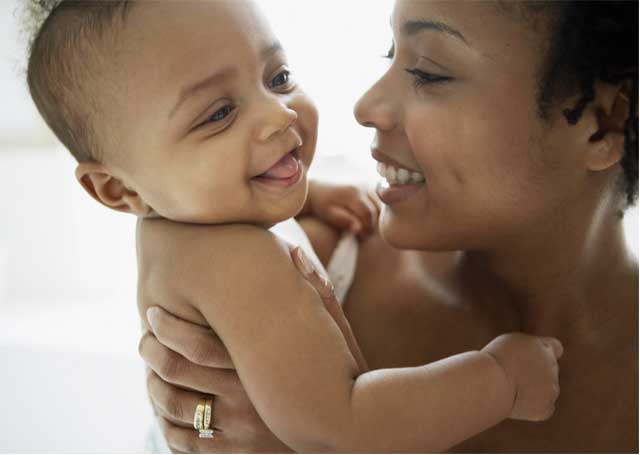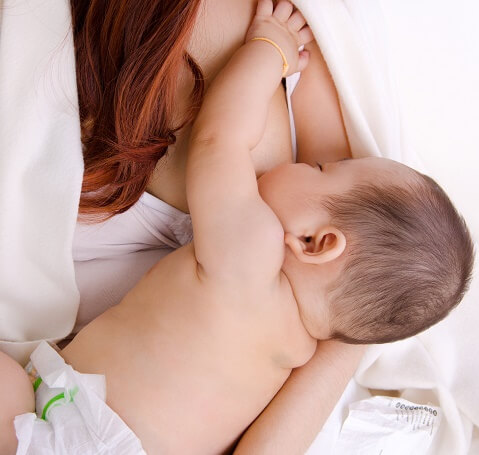The Baby-Friendly Hospital Initiative

Expectant mothers who deliver at Johns Hopkins are offered true “couplet care” after delivery, providing the best possible start for infants.
Our team supports immediate mother-baby bonding and breastfeeding for baby’s best health. For these efforts, we are a recognized Baby-Friendly hospital, awarded to hospitals by Baby-Friendly USA as part of the Baby-Friendly Hospital Initiative for delivering optimal infant care.
What is the Baby-Friendly Hospital Initiative?
The Baby-Friendly Hospital Initiative (BFHI), a global program that was launched by the World Health Organization and the United Nations Children’s Fund in 1991, recognizes hospitals and birthing centers that offer an optimal level of care for infant feeding and mother-baby bonding. According to their recommendations, breastfeeding is key to ensuring a baby’s best health, as outlined in BFHI’s “Ten Steps to Successful Breastfeeding.”
What is Baby-Friendly care and why is it important?
Typical baby care protocols in hospitals are not always baby-friendly. For example, in some hospitals when a woman delivers a baby, the newborn is often taken to a central nursery. There, the baby is placed under a warmer to help stabilize his or her body temperature. The pediatricians and nurses perform assessments and administer any medications that might be needed before reuniting baby with mother.
Research, however, strongly demonstrates that immediate skin-to-skin contact after delivery and breastfeeding are the keys to a healthy start in the life of a newborn.
Based on this research, baby-friendly care differs from typical hospital procedures and includes:
- Skin-to-skin contact between mother and baby immediately after delivery and throughout the hospital stay
- “Rooming in,” which keeps mother and baby together even during routine assessments of baby’s health
- Breastfeeding support by trained nursing staff
How does skin-to-skin contact affect newborns?
More than 40 years of research demonstrates the powerful benefits of skin-to-skin contact for newborns. Babies held skin-to-skin enjoy stable vital signs (breathing, heart rate, temperature, blood pressure and blood glucose levels). Babies cry less, sleep and feed better, and absorb the nutrients in and digest their food better. Mothers also benefit, helping women with pain management and milk production. Partners can enjoy skin-to-skin as a special way to bond with the baby, too.
The Johns Hopkins Hospital no longer has a central nursery, and babies are permitted — and encouraged — to stay with their mothers, as long as both parties are in good health.
How does The Johns Hopkins Hospital provide Baby-Friendly care?
After more than five years of significant changes in policies, protocols and practice, we were awarded the new status. Now, once the baby is delivered — given both mother and baby are healthy — the baby immediately gets uninterrupted skin-to-skin contact with the mother for the first hour of life. Complete mother-baby couplet care without separation has been a major change in care. Additionally, clinicians now perform the assessments in front of the parent(s) so they can ask questions.
We also promote and support exclusive breastfeeding, including offering breastfeeding classes and postpartum support groups. Board-certified lactation consultants are on our team, and all our perinatal nurses and clinicians have had additional breastfeeding training.
We stress the importance of breast milk and its nutritional value to babies. The nursing staff is committed to exclusive breastfeeding for all our patients and is dedicated to helping new moms be successful with breastfeeding.
Learn more about the birthing center at The Johns Hopkins Hospital.
Are all hospitals practicing Baby-Friendly perinatal care?
In the last decade, the number of Baby-Friendly designated hospitals has grown exponentially. In the first half of 2018, 25 percent of births took place in one of the 500 Baby-Friendly facilities nationally. The remaining hospitals without the designation may not provide this style of family-centric care.
Receiving the Baby-Friendly designation is a difficult process. It involves changing long-standing policies, protocols and behaviors. The Baby-Friendly Hospital Initiative includes a very rigorous credentialing process that includes a two-day site visit, where assessors evaluate policies, community partnerships and education plans, as well as interview patients, physicians and staff members.
The Johns Hopkins Hospital was the third hospital in Maryland and the first in Baltimore City to be certified. This was a remarkable accomplishment for The Johns Hopkins Hospital and was awarded thanks to the efforts of a multidisciplinary team extending across the Department of Gynecology and Obstetrics and the Department of Pediatrics. Both groups are committed to serving mothers and their newborns in anticipation of ensuring the optimal delivery experience.

